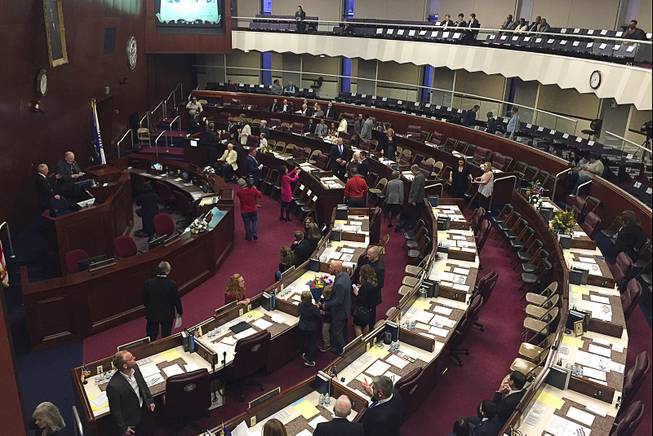
Ryan Tarinelli / AP
Assembly members gather before the Nevada Assembly in Carson City, Monday, Feb. 4, 2019. The Legislature began its session Monday as the first overall female majority legislature in U.S. history.
Monday, June 3, 2019 | 5:48 a.m.
CARSON CITY — On the penultimate day of the 2019 Legislature, lawmakers pushed forward multiple bills, including legislation creating a cannabis compliance board and instituting same-day voter registration.
Lawmakers will have further work to do today and are expected to work until midnight as the session marks its final day.
Here are some of the bills that moved forward Sunday.
Cannabis Compliance Board — Assembly Bill 533, legislation that would create the Cannabis Compliance Board, a goal of Gov. Steve Sisolak, passed through the Senate Sunday 14-6 with one abstention. It had previously passed through the Assembly 39-1.
The five-member board, appointed by the governor, would be involved in marijuana regulations around the state, but the bill would postpone any decision on licensing of consumption lounges pending a study by the newly created panel that would be turned over to lawmakers in the next legislative session.
Sen. Dallas Harris, D-Las Vegas, said it was her understanding the bill would supersede the current consumption lounge licensing decisions made by municipalities. As of now, the city of Las Vegas is the only local government that has voted to allow consumption lounges. The ballot initiative allowing use of recreational marijuana in the state approved by voters in 2016 does not allow the consumption of marijuana in public places, but advocates have pushed for creation of consumption lounges so that tourists and other marijuana users would have places to go to legally consume their products .
In past remarks, Helen Kalla, a spokesperson for Gov. Steve Sisolak, said the governor wanted to address consumption lounges the “right way” rather than the “quick way.”
Collective bargaining for state workers — Senate Bill 135, which would give collective bargaining rights to state employees, passed through the Assembly 28-13.
The bill had had little movement until late last week, when it was revived and an amendment was added that would essentially allow the governor to override any result of negotiations.
The bill had union support, including from the American Federation of State, County and Municipal Employees.
Collective bargaining for state workers was one of Sisolak’s campaign promises.
Same-day voter registration — Assembly Bill 345, which would allow same-day voter registration and expand online registration, passed through the Senate on party lines.
Assembly Democrats released a statement soon afterward, in which Speaker Jason Frierson, D-Las Vegas, called the bill historic.
“AB 345 will make the process of registering to vote more accessible and convenient for all eligible Nevadans as well as strengthening our election process. This is perhaps the most comprehensive improvement to our state’s electoral and voter system in decades,” Frierson said in the statement.
K-12 education funding — Both the Senate and the Assembly passed Senate Bill 555, the budget bill for K-12 education over the biennium, unanimously.
It was the first bill heard on the floor Sunday and is the first of the five budget bills to pass.
Among many other actions, the legislation sets the per-pupil funding level for the next biennium at an average total of $10,227 for fiscal year 2019-2020 and $10,319 for fiscal 2020-2021.
Under the current education system, the Nevada Plan, per-pupil funding makes use of multiple sources, including state funding and local taxes. The basic funding guarantee per-pupil is not the same around the state in the SB 555, but Clark County would get $6,067 per pupil from the state under the bill in the next fiscal year.
This bill does not involve the comprehensive overhaul of the Nevada Plan with the Pupil-Centered Funding Plan per Senate Bill 543. Senate Bill 543 has not been voted out of the Assembly Committee on Ways and Means.
The K-12 budget is required to be passed before any other budget bill, so its passage opens the door for the others.
Authorizations bill — The Senate passed a second budget bill — Senate Bill 553, the authorizations bill — unanimously.
The authorizations bill sets expenditures for state agencies throughout the next biennia.
There were no remarks on the bill made on the floor after introduction. The other funding bills — capital improvement, appropriations and employee pay — had not passed both houses as of midnight Monday.
